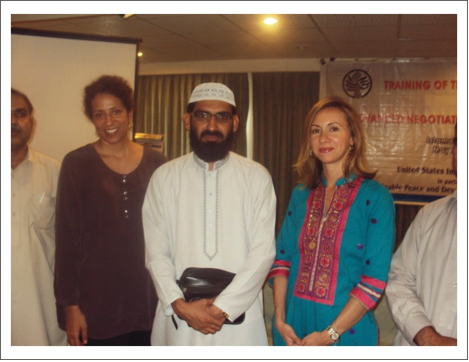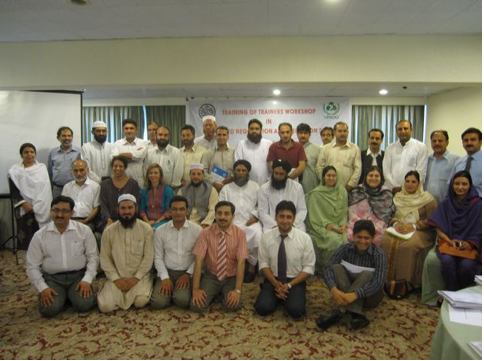Education and Training Center/International Senior Program Officers Nina Sughrue and Linda Bishai conducted the third training of trainers (TOT) in advanced mediation skills, May 23-25, 2010, for our network of Pakistani conflict resolution facilitators. The program was in conjunction with our long term local partner the Sustainable Peace and Development Organization (SPADO) in Islamabad.
Education and Training Center/International Senior Program Officers Nina Sughrue and Linda Bishai conducted the third training of trainers (TOT) in advanced mediation skills, May 23-25, 2010, for our network of Pakistani conflict resolution facilitators. The program was in conjunction with our long-term local partner, the Sustainable Peace and Development Organization (SPADO) in Islamabad. The May workshop included the 20 original facilitators (see more information regarding the previous workshops), as well as 15 new participants, including seven religious scholars from Peshawar. The facilitators hail primarily from Pakistan’s most conflict ridden provinces: the Federally Administered Tribal Areas (FATA) and Khyber Pukhtunkhwa, formerly known as the North West Frontier Province (NWFP). The ethnically diverse and gender balanced group includes non-governmental organization workers, journalists, religious scholars, and academics.
Building on the work done last year, the goal of the May workshop was to provide advanced mediation skills in order for the facilitators to apply them to specific conflicts in their communities. The workshop consisted of advanced conflict analysis, conflict ripeness, mediator  readiness, and problem solving skills. After each training module, they applied the teachings individually to a conflict in their community. As such, participants worked individually on their conflicts, applying the skills and techniques to their individual worksheets. After the completion of their individual work, participants were brought back together in groups. The groups were based on geographical location: one group was from Swat, two from Peshawar, one from FATA, one from Khyber Pukhtunkhwa, and one group of religious scholars from Peshawar . In the groups, participants shared their conflicts and through a consensus process had to pick one to present to all of the participants. Groups were based on location for participants to build relationships to address conflicts in their communities. Participants left the workshop with their own conflict analysis, conflict ripeness, mediator readiness and action plans which included small, tangible steps they could take immediately to work toward preventing and/or resolving conflicts in their communities.
readiness, and problem solving skills. After each training module, they applied the teachings individually to a conflict in their community. As such, participants worked individually on their conflicts, applying the skills and techniques to their individual worksheets. After the completion of their individual work, participants were brought back together in groups. The groups were based on geographical location: one group was from Swat, two from Peshawar, one from FATA, one from Khyber Pukhtunkhwa, and one group of religious scholars from Peshawar . In the groups, participants shared their conflicts and through a consensus process had to pick one to present to all of the participants. Groups were based on location for participants to build relationships to address conflicts in their communities. Participants left the workshop with their own conflict analysis, conflict ripeness, mediator readiness and action plans which included small, tangible steps they could take immediately to work toward preventing and/or resolving conflicts in their communities.
The level of enthusiasm and gratitude was overwhelming. Here are a few comments we received about the May training: 
The workshop about Peace Prevalence in Islamabad, organized by your esteemed organization, was something to be admired. I salute your struggles for peace...It is of immense importance to prepare the religious heads to work against gender based viol[ence] in the orthodox Pashtun society. We ...look forward to further cooperation.
- Syed Irfan Ullah Shah Hashmi, religious scholar
I was fortunate to be part of the last TOT training on conflict management again from you. I was really inspired by the way of communication and facilitation. Keep up this good work for a cause of seeing this planet as a safer place for humans and other creatures.
- Talib Jan, human rights activist and development specialist



